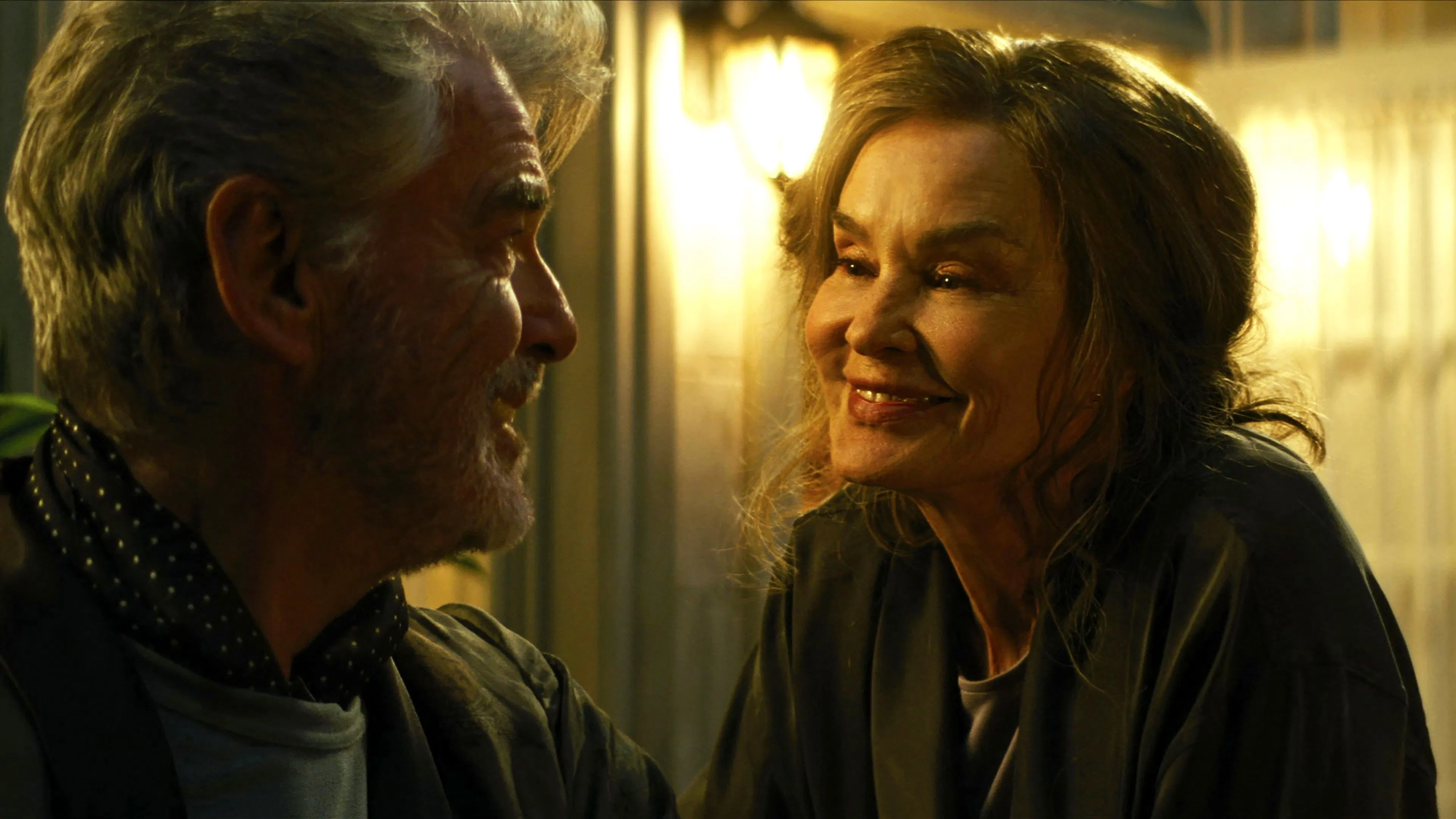The Great Lillian Hall is a Vanishing Act You Won’t Forget
Originally set to star Meryl Streep, this deeply felt drama gives Jessica Lange a luminous role that will speak to anyone who’s felt the pangs of ageing.
good.film
9 months ago

Share

For years, there’s been a bit of a double-whammy for older actresses on screen: a lack of roles to play, and when they DO come along, a lack of depth to them. There’s only so many ‘wisecracking grandmas’ you can sink your teeth into, right Susan Sarandon? Now in cinemas, The Great Lillian Hall feels like a welcome antidote to both. Lillian Hall is a meaty and meaningful character for two-time Academy Award winner Jessica Lange, in a film that poses rich questions about memories, our sense of self, and the legacies we leave behind.
What’s The Great Lillian Hall About? Revered Broadway actress Lillian Hall has never missed a performance - but in rehearsals for her latest play, her memory and confidence is challenged.
Who Directed The Great Lillian Hall? Michael Cristofer
Who Stars in The Great Lillian Hall? Jessica Lange, Kathy Bates, Pierce Brosnan, Lily Rabe
Where Can I See The Great Lillian Hall? The Great Lillian Hall is out now in Australian cinemas. Get discount movie tickets to see it for less at Dendy, Event, Village and Hoyts Cinemas right here. We donate $1 from every Good Tix sold to Australian charities.
An easy sum-up is The Great Lillian Hall is the female version of The Father, the outstanding dementia drama that won Anthony Hopkins his second Oscar. But where that film focused on the effects of memory loss on family, The Great Lillian Hall is geared far more towards Lillian’s career. She’s a legendary (super famous, award-winning) theatre actress, renowned for her dedication and skill. So when she begins to drop lines during rehearsals for her high-profile new version of Chekhov’s The Cherry Orchard, it hits Lillian at the very core of her identity.
How does The Great Lillian Hall deal with the stigma of dementia?
Ever feel embarrassed when you’ve forgotten a name? There’s a kind of recoil (even a horror) that we might be ‘losing it’, and that shame and stigma all plays a part in the ongoing misunderstanding of dementia. For those suffering from the effects, the first instinct is denial. A few small forgetful moments can be brushed away – at first, Lillian blames her allergies, saying This time of year, it just muddles me! But soon, she’s blanking on breakfast dates with her daughter Margaret (Lily Rabe) and stage directions that were set by the play’s director David (Jesse Williams) the day before.
Lillian’s a great actress, so it’s easy to cover up the medical and emotional realities of what she’s experiencing – until it’s not. Soon, she can’t slice food, let alone deliver a monologue. Pulitzer Prize and Tony Award-winning director Michael Cristofer brings more hand-held camera into these scenes, and it’s effective; Lillian’s unmoored, on shaky ground. Other techniques put us further into her mindset, like when she loses her bearings on the streets of New York: the visuals lose focus, the soundscape becomes a shrill shriek. At lunch, Margaret’s questions overlap with the restaurant chatter – it’s too busy, with echoes, like she's entering a tunnel. Lillian can't quite keep things straight. But she also can’t admit to her daughter, her castmates, or her longtime assistant Edith (Kathy Bates) what’s happening to her.
One space with zero stigma is the specialist office of Dr DeMayo (Keith Arthur Bolden), but by putting a clear lens on the logistics of dementia, it’s also the space Lillian fears the most. The doctor is charming, and his tests are simple – to us. But of course, they’re designed to show up the cognitive abilities that are frequently impaired by dementia. The supreme showwoman, Lillian laughs off her failures until she can't anymore. When her tears well up and her hands start shaking, it’s the first honest reaction we’ve seen – and a real contrast to the 'show must go on’ persona she’s known for at the theatre. Will I still be me? she asks, in a rare vulnerable moment. Will I even know who I am? The answer is painfully real: Sometimes. Sometimes not.
How are relationships and family explored in The Great Lillian Hall?
It says a lot that Lillian’s closest relationship is actually with her assistant Edith, not with her own daughter. As they negotiate her daily schedule, their interaction is playful, crotchety, funny – and vastly different to how Lillian and Margaret get along. It’s fascinating to watch both sets of dynamics when all three women are in the same room side by side. Margaret is family and Edith isn’t, but we get the sense Lillian would far sooner confide in her assistant than her daughter.
That speaks to the importance of support networks OUTSIDE of family. When she’s diagnosed with Lewy Body dementia, Lillian is facing more than normal ageing; she’s soon in real decline. What does that look like? Will Edith morph from a professional PA to a personal carer? There’s no playbook, of course, and Cristofer includes blobs of tension that you just know would come up in real life if a family member was hiding their health issues. Edith can spot the signs, and she loses patience with Lillian’s cover stories. I've been running lines with you for 25 years so cut the crap. I went through this with my father, so please, spare me the charade!
On the flip side, The Great Lillian Hall lays out the complex feelings of neglect and resentment Margaret feels about a mother that always seemed to prize her career over raising her. It's pretty clear that Lillian prioritizing the stage cost them a chance at a deeper, more meaningful mother-daughter relationship. Now, Margaret misinterprets Lillian’s forgetfulness – like not asking about her daughter’s new job – as disinterest.
There’s a very emotional scene where Margaret finally confronts her mother, and on the surface it’s about why she hid her diagnosis. But underneath, it’s really about why she disappeared from her life. The irony is that Lillian feels like she’s slipping away NOW, but for Margaret that happened long ago. You never really wanted to be my mother, she tells her, you just wanted to play the part.
How does The Great Lillian Hall play with memories and the past?
One of the recurring motifs Director Michael Cristofer uses throughout the film is the appearance of Carson (Michael Rose), Lillian’s late husband (and might we add, a VERY dapper silver fox). He first slips into her dressing room like a ghost – she hears him whisper to her, then he's gone. It’s up to you how you interpret what Lillian saw and felt. Like The Father, Cristofer is including little hints of what it’s like for Lillian as the connections in her brain begin to change. Dead loved ones usually only appear in horror movies; for a dementia sufferer though, memory is much more fluid, and her husband is just a memory after all. Perhaps to her, he’s really in the room?
Carson was more than Lillian’s spouse – he was also a theater director who’d worked alongside her. In other words, he was a source of both personal AND professional comfort. So as Lillian’s dementia worsens, Carson’s appearances get more frequent, symbolizing the support that she’s missing both at home and in her career. There’s an interesting scene where Lillian’s stage character Lyubov mentions her own husband, and suddenly, Lillian sees Carson in the audience. For a moment, seeing him actually inspires her to deliver a deeper, more intense performance – as if the fog of confusion has lifted, like a broken spell.
What does The Great Lillian Hall say about fame?
Dementia isn’t an easy ride for anyone. For a theatre actress – with no editing or cue cards to hide behind – it leaves Lillian terrifyingly exposed. She already feels the weight of ageing in a profession that prizes springy youth and tight faces (her much younger understudy looms just off the stage, ready to replace her at any second). And part of her job is to access pain and deep emotions every day. Now add the emotional toll of confronting her rapid decline.
Director Michael Cristofer uses the theatre setting as metaphor: the stage has been Lillian’s ‘real life’, and the time spent off it is just waiting until the next curtain goes up. When she loses her place in rehearsal, the stage lighting shifts to red - an instant visual to show her pressure and panic. Lillian feels like she’s nothing without that purpose of stepping on those boards and taking her bows. She admits as much to Edith: The play is my life right now, and no-one's gonna take it away from me.
What’s the takeaway from The Great Lillian Hall?
Some of us here at good.film have lived with family members the same age as Lillian, and seen first-hand how dementia affected them. The Great Lillian Hall gets the experience exactly right. There’s the physical aspects, like shaking, light-headedness, the sudden fatigue. Memory loss is often the MOST noticeable part, and the symptom that creates the most problems in the film for Lillian, with a complex classical text to memorize. But harder-hitting are the emotional beats: the confusion, the denial, the shame, the anger and the blame. Are there seven stages of grief for losing your mind? Because there should be.
What the film outlines is that dementia doesn’t discriminate – whether you’re affluent or struggling, famous or unknown, strong-willed or meek makes no difference. Doubling down on her rehearsals, Lillian’s determined to open the play, urging her director ‘I won't let you down David, I promise. I won't let you down.’ But ultimately, that’s not up to her. The film points out one of the cruelest aspects of dementia: that it strips autonomy and will from even the most determined people. The effects can be concealed, but ultimately, the decline is unstoppable.
The Great Lillian Hall doesn’t go too Hollywood by the final scene – there’s no magic reprieve, as much as we might like one. But there IS a hopeful note to walk out on. Cristofer leaves us with the idea that, as much as Lillian’s diagnosis starts to dissolve the very core of her identity, it’s her legacy that matters more to her. What she leaves behind & how she’ll be remembered. And it’s not too late to change that before she walks off stage. Or as the Great Lillian Hall describes it (ever the diva): ‘My final exit.’
The Great Lillian Hall is out now in Australian cinemas. Get discount movie tickets to see it for less at Dendy, Event, Village and Hoyts Cinemas right here. We donate $1 from every Good Tix sold to Australian charities.

